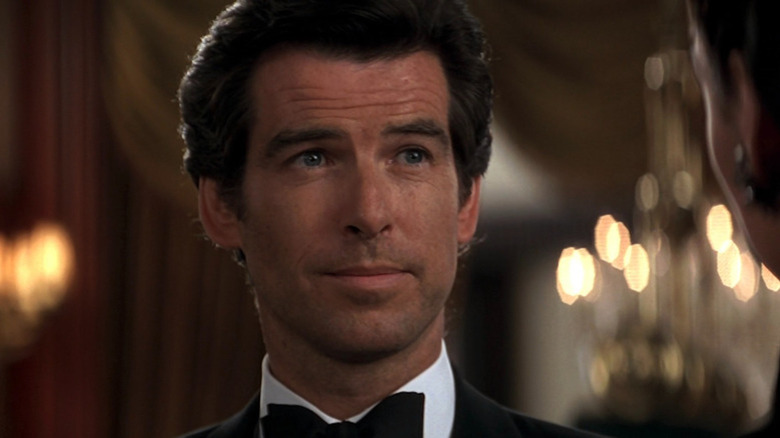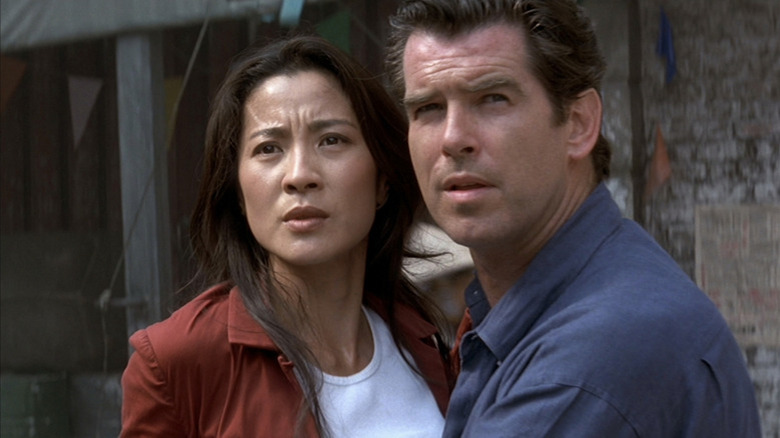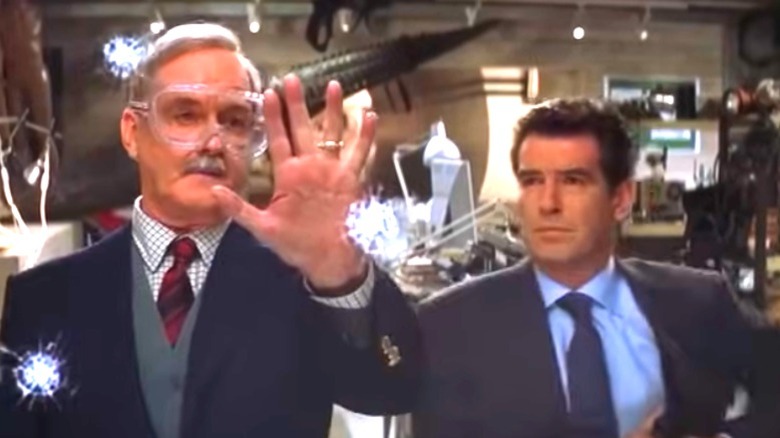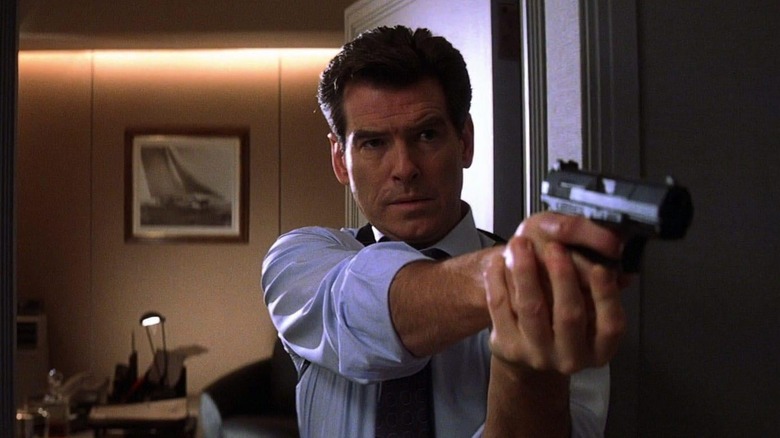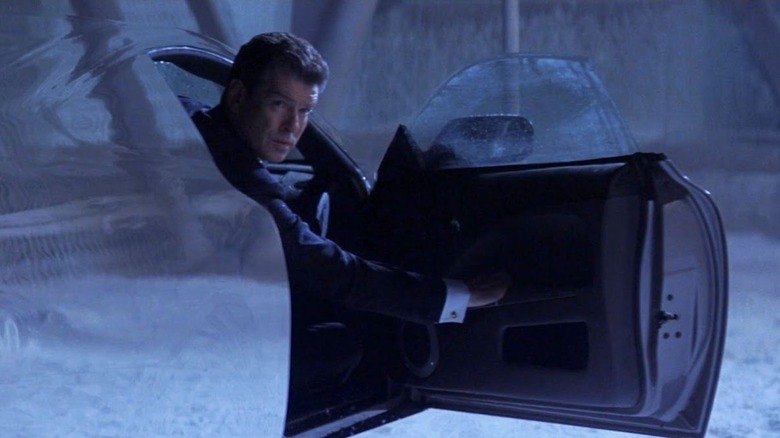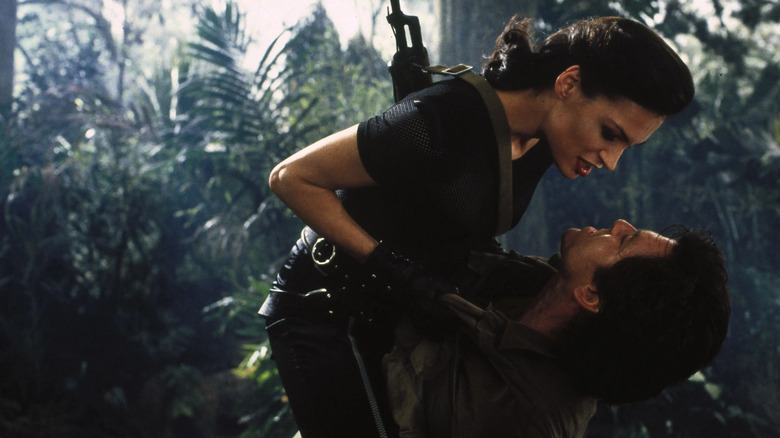The Correct Order To Watch Pierce Brosnan's James Bond Movies
There exists an alternate cinematic realm wherein Pierce Brosnan, having concluded his run on the briefly successful NBC action-drama "Remington Steele," inherited the role of James Bond from Roger Moore and likely guided the franchise through a rapidly shifting geopolitical landscape. It's possible he could've failed, but that would've been the fault of the production team led by Albert "Cubby" Broccoli. Because Brosnan was born to play Bond. Broccoli even said as much when he met the actor on the set of 1981's "For Your Eyes Only." Though I'm a huge Timothy Dalton supporter, I think versions of "The Living Daylights" and "License to Kill" tailored to Brosnan's more debonair persona would've been much bigger hits, and brought a quick resolution to the legal wrangling that hastened Dalton's departure.
Pierce Brosnan was the platonic ideal of a big-screen James Bond.
Alas, NBC boneheadedly misread the ratings uptick the due-to-be-cancelled "Remington Steele" received in the wake of Brosnan's rumored Bond casting as renewed interest in the fading series, and thus exercised its option for a sixth season. Suddenly, Brosnan was off the market, forcing Broccoli to quickly shift to Dalton.
When Dalton's run ended, and the franchise was cleared for a reboot six years after the tepid box office performance of "License to Kill," Brosnan found himself taking over a franchise that arguably needed him more than he needed it. It was an invigorating resuscitation. Though director John Glen had done his best work for the series on the Dalton movies, filmmaker Martin Campbell gave Brosnan's first Bond, "GoldenEye," the muscle of a modern '90s action movie. 007 was back and more dashingly lethal than ever.
Brosnan's four-movie run as James Bond was an unqualified commercial success, though there's not a single top-five entry among them. One is nearly great, one is solid, one is a frustrating misfire, and one is the worst 007 movie ever made. Given the lack of an overriding arc (which the series offered up with Daniel Craig's five-movie saga), you're free to watch the Brosnan films in whichever order pleases you. But if you're looking for maximum Brosnan Bond pleasure, here's how I'd play it.
The Production Order
The production order of Pierce Brosnan's James Bond run is as follows:
"GoldenEye" (1995)
"Tomorrow Never Dies" (1997)
"The World Is Not Enough" (1999)
"Die Another Day" (2002)
Though critics cooled on the Brosnan movies after "GoldenEye" (the only certified fresh Pierce installment at Rotten Tomatoes; Sean Connery's "Goldfinger" is the undisputed RT Bond champ), the first three films rolled off the factory line with little behind-the-scenes drama. But if you watch these movies in chronological order, you'll notice a progressive decline in quality. This is why I recommend taking a different route.
The Correct Order
"Die Another Day" (2002)
"The World Is Not Enough" (1999)
"Tomorrow Never Dies" (1997)
"GoldenEye" (1995)
If you're dead set on watching all four Brosnan Bonds, start with the worst — or, trust me, there's no way you'll ever watch it. (I certainly can't guarantee you'll finish "Die Another Day," but if you bail, you'll miss the film's best scene: a third-act sword fight between Halle Berry and Rosamund Pike.) Heading in this direction will also lessen the disappointment of "The World Is Not Enough," which, under Michael Apted's capable direction, kicks off with a spectacular boat chase around London's Millennium Dome (a top-ten opening sequence for the franchise). And since your expectations won't be sky high after "GoldenEye," you'll be able to almost forgive director Roger Spottiswoode for not giving Michelle Yeoh more to do in "Tomorrow Never Dies."
Why This Is the Correct Order
Again, the only way you're going to make it through all four of these installments is if you leave the very best for last. And I think there's value in this if you supplement your viewing with at least a toe-dip into why Brosnan fizzled out in the role he was always meant to play.
Though Brosnan's entries keep getting worse, they're tripped up by a rise in conceptual ambition. It was fairly standard Bond business until the Craig movies that we'd get a new 007 adventure every other year. That three years passed between "The World Is Not Enough" and "Die Another Day" probably doesn't look like much on the surface, but there was a significant push behind the scenes, largely by Brosnan, to portray the character in a manner closer to the colder-hearted killer of Ian Fleming's novels.
So when you throw on "Die Another Day," and find yourself a tad stunned by the vicious torture of our hero at the hands of North Korean soldiers, know that this is effectively all that remains of Brosnan's vision for a darker 007 installment. How close did the production team get to giving us a rougher Bond? We know they hired and fired Michael Apted before quickly pivoting to A-listers John Woo and Tony Scott. When the latter declined, he recommended his friend Quentin Tarantino, who made a drunkenly passionate pitch. Brosnan was also keen on John McTiernan and Ang Lee (the latter of whom had just won the Oscar for Best Director for "Crouching Tiger, Hidden Dragon"), but his biggest swing was Martin Scorsese. The two apparently discussed the possibility on a flight, but, like many of these other filmmakers, Scorsese likely demanded final cut before he signed on (something the Broccolis would've never granted).
The tragedy is that the perfect director for "Die Another Day" had been available during this search, but he had yet to prove himself on a major studio production.
The Nolan Option
When "Die Another Day" commenced principal photography on January 11, 2002, Christopher Nolan was ensconced in an editing room putting the finishing touches on his studio breakout film "Insomnia." "Memento" had firmly established him as a filmmaker to watch (he would share an Oscar nomination for Best Original Screenplay with his brother Jonathan later that month), but no one came away from that small-scale neo-noir thinking his next logical move was helming a $140 million studio tentpole. And unless he revealed it in an interview at the time, not many people knew the man was a James Bond fanatic.
Had Nolan landed the gig by some film industry miracle, the Broccolis and Michael Wilson would've had so much leverage over him that he probably would've gotten fired the second he tried to color outside the lines. I'd like to think he would have objected to the movie's most idiotic set piece (Bond speeding around in an invisible Aston Martin), but the man made three Batman movies with vehicles capable of performing a multitude of unrealistic functions. Maybe the car would've stayed. (And maybe we'll get a Nolan Bond one of these days.)
A Golden beginning (or ending, if you follow our advice)
Keeping all of this in mind might give you something to think about when "The World Is Not Enough" slows to a crawl, which, aside from that opening, is basically anytime Sophie Marceau isn't on screen (she gives a legitimately superb performance here). In terms of improbable car stunts, Bond driving a BMW from the back seat via remote control seemed silly at the time, but it's well within the range of possibility now. But I'd put up with all manner of ludicrousness when the trade-off is Michelle Yeoh proving time and again why she should've been one of the biggest action stars in the entire world at the time.
And then there's "GoldenEye," an expertly directed action flick that gives us two knockout villains (Sean Bean and Famke Janssen), some of the franchise's most impressive stunts (that dam jump in the opening scene is no joke) and Brosnan at his suavest. I just wish he'd been able to make a Bond movie as thrilling as "The Living Daylights," one with a proper John Barry score (the legendary composer quit the franchise after "Daylights," and the producers made the disastrous decision to hire dullard Éric Serra for "GoldenEye", whose score was so lousy they had to hire John Altman to rescore the tank chase).
"GoldenEye" is no classic, but it is a very good Bond movie that will leave you pondering what might've been had NBC not renewed "Remington Steele" in 1986.
